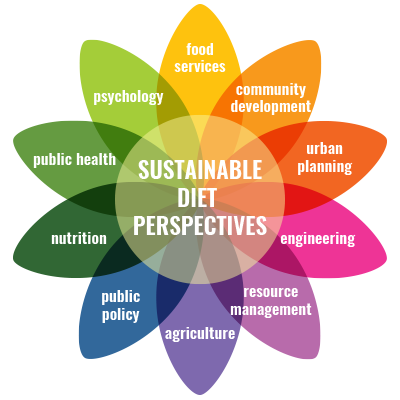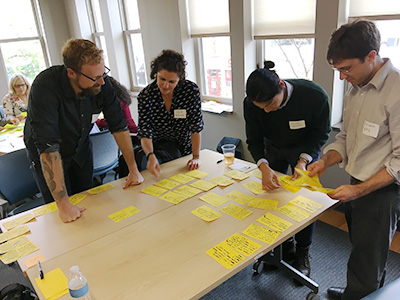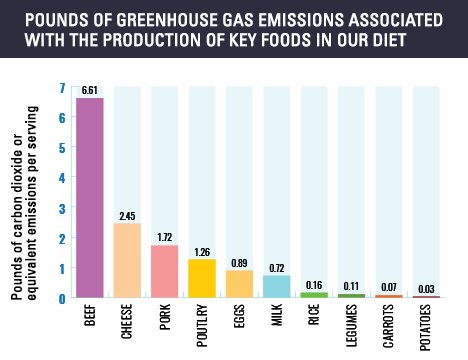
The Diet Shifts workshop brought together participants representing complementary fields and disciplines to address sustainable diets.


Animal-source foods in general contribute the most greenhouse gases per serving, but the amount of emissions from beef are significantly higher than pork and poultry, not just grains and vegetables. This figure was adapted with permission from Heller & Keolaian (2014); more key facts, findings, and graphics on food system sustainability, as well as other sectors, can be found via the U-M Center for Sustainable System factsheet series.
Imagine being tasked with making our diets more sustainable. Where would you start? Would you target food production or focus on behavior change? Top-down policies or grassroots community action? These questions prompted a team of faculty and researchers at the University of Michigan, led by Dr. Andrew Jones, Assistant Professor at the School of Public Health, and Dr. Martin Heller, Research Specialist for the Center for Sustainable Systems, to convene thought leaders at a workshop to set a research agenda.
Little is known currently about what motivates people to make their diets more healthy and sustainable, and as Heller explains, “We need to build the understanding, stakeholder network, and momentum to develop evidence-based diet shift strategies that communities, policymakers, and institutions can use.”
Setting The Table
Since numerous factors influence our choices about what we eat - economics, nutrition, psychology, public health, community development, and education, to name a few - the workshop brought in 20 representatives from academia, the local Michigan non-profit sector, and the food service industry to capitalize on their expertise. Funded by a Catalyst Grant from the U-M Graham Sustainability Institute, the workshop was quick-paced and action-oriented; two facilitators from the Center for Socially Engaged Design led the attendees through a deliberate process to pool knowledge, align approaches, and coalesce support for a suite of practical next steps.
Key Ingredients For A Winning Recipe
Three findings stood out from the workshop as essential themes for future action. The first is that efforts to make diets more sustainable should focus on the highest-impact foods. While a reduction in overall meat consumption would make a substantial dent in our carbon emissions, there was consensus from the workshop that targeting beef would have the greatest impact. One serving of beef is associated with more than five times the carbon emissions of poultry, and four times those of pork.
However, beef is a cornerstone of many aspects of American cuisine, from quarter-pound burgers to New York strip steaks. Dr. Ashley Gearhardt, a workshop participant and Associate Professor of Psychology at U-M, emphasized the benefit of incremental strategies. “Shifting people from beef to pork, or more ideally to poultry or fish, rather than completely giving up animal products may be a more appealing possibility for many people.”
The second finding is that efforts should target key populations. Steven Mangan, Senior Director of Michigan Dining, described efforts at U-M targeting one such group: college students. By providing better access to sustainable menu options, dining services and researchers can help college students develop their own values and preferences that will extend well into adulthood. Outside of universities, large-scale private food service companies can use this model of subtle shifts in purchasing or menu choices to reduce their environmental footprints. Given the reach of these organizations across all corners of the United States, even small shifts at this level can create meaningful impact.
The third finding is that facilitating a shift to sustainable diets requires concerted actions from change agents in diverse spaces. Through collaboration, complementary fields and sectors can unify individual efforts to amplify effect, for example, integrating public health and resource management policies into urban planning. Workshop participants acknowledged the cornerstone roles of traditional stakeholders - non-profits, community leaders, and religious centers - but brainstormed non-traditional actors to involve in response to changing media and opportunities, such as financial planners and social media influencers.
Summed up by Richard Waite, an Associate at the World Resources Institute: “Dietary change at scale can only happen when the right mix of skills and perspectives come together. No one individual, organization, university department, or food provider can solve this on their own.”But with focused action taken up by a coalition of change agents, we can make sustainable diets achievable.
Learn more on the project webpage.
| WORKSHOP PARTICIPANTS | |
|---|---|
| Kelly Brownell, PhD, MS | Duke University, Sanford School of Public Policy, World Food Policy Center |
| Alex Bryan | University of Michigan, Michigan Dining |
| Ashley Gearhardt, PhD | University of Michigan, Department of Psychology |
| Zachary Gersten, MPH | University of Michigan, School of Public Health, Department of Nutritional Sciences |
| Mike Hamm, PhD | Michigan State University, Center for Regional Food Systems |
| Brent Heard | School for Environment and Sustainability, Center for Sustainable Systems |
| Marty Heller, PhD | University of Michigan, Center for Sustainable Systems |
| Lesli Hoey, PhD, MRP | University of Michigan, Taubman College of Architecture and Urban Plannig |
| Andrew Jones, PhD | University of Michigan, School of Public Health, Department of Nutritional Sciences |
| Greg Keoleian, PhD, MSE | University of Michigan, School for Environment and Sustainability, Center for Sustainable Systems |
| Laurie Lachance, PhD, MPH | University of Michigan, School of Public Health, Department of Health Behavior & Health Education, Center for Managing Chronic Disease |
| Steve Mangan, AOS | University of Michigan, Michigan Dining |
| Roni Neff, PhD, ScM | Johns Hopkins University, School of Public Health, Department of Environmental Health and Engineering |
| Lindsey Parnarouskis | University of Michigan, Department of Psychology |
| Christina Roberto, PhD | University of Pennsylvania, School of Medicine, Psychology of Eating and Consumer Health Laboratory |
| Diego Rose, PhD, MPH, RD | Tulane University, School of Public Health and Tropical Medicine |
| Paul Rozin, PhD, MA | University of Pennsylvania, Department of Psychology |
| Sarna Salzman, MS | SEEDS |
| Julia Simenauer | University of Michigan, Department of Psychology |
| Richard Waite, MA | World Resources Institute |
| Julia Wolfson, PhD, MPP | University of Michigan, School of Public Health, Department of Health Management and Policy, Department of Nutritional Sciences |